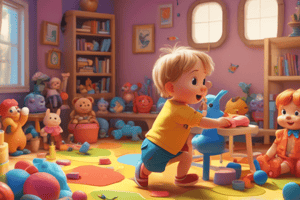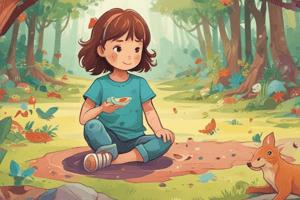Podcast
Questions and Answers
Which type of play involves physical movement and promotes active and healthy lifestyles?
Which type of play involves physical movement and promotes active and healthy lifestyles?
- Sociodramatic play
- Parallel play
- Rough-and-tumble play (correct)
- Onlooker play
What is effortful control?
What is effortful control?
- The skill to navigate social situations
- The ability to manage emotions and actions (correct)
- The capacity for creative problem-solving
- The ability to understand others' perspectives
At what age do children start developing effortful control?
At what age do children start developing effortful control?
- Teenage years
- Early childhood (correct)
- Early adulthood
- Middle age
What are the benefits of sociodramatic play?
What are the benefits of sociodramatic play?
Which stage of social play involves kids playing near each other but not interacting?
Which stage of social play involves kids playing near each other but not interacting?
Which type of motivation is characterized by doing something for an external reward or to avoid punishment?
Which type of motivation is characterized by doing something for an external reward or to avoid punishment?
Which type of motivation is characterized by doing something because you enjoy it or find it interesting?
Which type of motivation is characterized by doing something because you enjoy it or find it interesting?
What are some behaviors exhibited by children with intrinsic motivation?
What are some behaviors exhibited by children with intrinsic motivation?
What are some behaviors exhibited by children with extrinsic motivation?
What are some behaviors exhibited by children with extrinsic motivation?
What is one warning mentioned about extrinsic rewards?
What is one warning mentioned about extrinsic rewards?
Which of the following is a long-term consequence of child maltreatment?
Which of the following is a long-term consequence of child maltreatment?
What percentage of children in Dodge's project were at high risk for bad treatment?
What percentage of children in Dodge's project were at high risk for bad treatment?
What are some emotional problems that can persist into adulthood as a result of child maltreatment?
What are some emotional problems that can persist into adulthood as a result of child maltreatment?
What brain parts are affected by bad treatment and play a role in controlling emotions?
What brain parts are affected by bad treatment and play a role in controlling emotions?
What are some symptoms of post-traumatic stress disorder (PTSD) that maltreated children may display?
What are some symptoms of post-traumatic stress disorder (PTSD) that maltreated children may display?
Flashcards are hidden until you start studying
Study Notes
Types of Play
- Active play involves physical movement and promotes active and healthy lifestyles.
Effortful Control
- Effortful control is the ability to regulate one's behavior and emotions.
- Children start developing effortful control at around 12-18 months.
Sociodramatic Play
- Sociodramatic play has several benefits, including promoting social skills, empathy, and problem-solving.
Stages of Social Play
- Parallel play is a stage of social play where children play near each other but not interact.
Types of Motivation
- Extrinsic motivation is characterized by doing something for an external reward or to avoid punishment.
- Intrinsic motivation is characterized by doing something because you enjoy it or find it interesting.
Behaviors Exhibited by Children
- Children with intrinsic motivation typically exhibit behaviors such as persistence, enthusiasm, and creativity.
- Children with extrinsic motivation typically exhibit behaviors such as compliance, anxiety, and competition.
Warning about Extrinsic Rewards
- One warning about extrinsic rewards is that they can undermine intrinsic motivation.
Consequences of Child Maltreatment
- Long-term consequences of child maltreatment can include emotional problems, anxiety, and depression that persist into adulthood.
- Dodge's project found that around 20% of children were at high risk for bad treatment.
Emotional Problems
- Emotional problems that can persist into adulthood as a result of child maltreatment include anxiety, depression, and low self-esteem.
Brain Parts Affected
- Child maltreatment can affect brain parts such as the amygdala, hippocampus, and prefrontal cortex, which play a role in controlling emotions.
Symptoms of PTSD
- Symptoms of PTSD that maltreated children may display include flashbacks, nightmares, and avoidance of triggers.
Studying That Suits You
Use AI to generate personalized quizzes and flashcards to suit your learning preferences.




